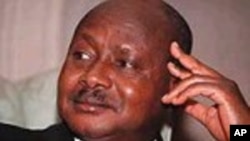Britain has joined Ireland in suspending aid to Uganda’s office of the prime minister. The move comes after a draft report by Ugandan’s auditor-general found that over $15 million [€12 million] in aid had been transferred to unauthorized accounts in the office of the Ugandan prime minister.
The money was meant to have been spent on helping the needy, and to help pay for a ‘peace recovery and development program’ in northern Uganda after decades of conflict and devastation.
The Ugandan government has pledged prosecutions. Two senior officials have been charged, while 17 others have been suspended as the investigation continues.
“This report does not surprise anybody,” said Dr. Fredrick Golooba Mutebi, a political analyst and a visiting fellow at the University of Manchester in the United Kingdom. The only shock, he added, “is the amounts of money stolen are quite colossal.”
He exonerated Uganda’s Prime Minister, Amama Mbabazi, saying he has just been appointed to the office and that the theft has been going on for a long time. “The only way you can hold him responsible is that he has been Secretary General for the ruling party for a long time. So you can hold the ruling party responsible, in which case he is culpable.”
Mr. Mbabazi has reportedly publicly apologized to Ireland, saying no money was ever paid to him, and that he never handles the aid money.
He said that although the missing money was discovered in private bank accounts, not all of it was ‘misappropriated,’ but ‘merely irregularly managed,’ according to local media reports.
“I think the government is half-hearted about fighting corruption,’’ said Mutebi. He said the government is able to wage such a fight, but it may not be in its best interest to prosecute senior officials accused of corruption.
He noted that if the politically influential can behave with impunity, then it's seen as hypocrtical to pursue ordinary members of the public.
The government, he said, is also constrained by the fact that some of its most senior officials are as corrupt as the people who stole money from the prime minister’s office.
Mutebi described the level of impunity in the country. “Impunity in Uganda is not only in connection with corruption, but in connection with various other misdeeds by government officials, and people connected to the ruling party.”
But Mutebi said the donors can do something about the theft of donor funds. “They [donors] could decide to withhold general budget support and go for project funding – where they have a much closer watch over the money.”
“But as long as they [donors] put the money in the government’s kitty, it is really beyond them to control what the government does with it.”
The donors, he explained, could withhold the aid. Donors could claim that if they do that it could be punitive to poor people, but there is no empirical evidence for that.
“If large amounts of donor money are being stolen, in what sense are they going toward funding things that are important to poor people?” he wondered.
The money was meant to have been spent on helping the needy, and to help pay for a ‘peace recovery and development program’ in northern Uganda after decades of conflict and devastation.
The Ugandan government has pledged prosecutions. Two senior officials have been charged, while 17 others have been suspended as the investigation continues.
“This report does not surprise anybody,” said Dr. Fredrick Golooba Mutebi, a political analyst and a visiting fellow at the University of Manchester in the United Kingdom. The only shock, he added, “is the amounts of money stolen are quite colossal.”
He exonerated Uganda’s Prime Minister, Amama Mbabazi, saying he has just been appointed to the office and that the theft has been going on for a long time. “The only way you can hold him responsible is that he has been Secretary General for the ruling party for a long time. So you can hold the ruling party responsible, in which case he is culpable.”
Mr. Mbabazi has reportedly publicly apologized to Ireland, saying no money was ever paid to him, and that he never handles the aid money.
He said that although the missing money was discovered in private bank accounts, not all of it was ‘misappropriated,’ but ‘merely irregularly managed,’ according to local media reports.
“I think the government is half-hearted about fighting corruption,’’ said Mutebi. He said the government is able to wage such a fight, but it may not be in its best interest to prosecute senior officials accused of corruption.
He noted that if the politically influential can behave with impunity, then it's seen as hypocrtical to pursue ordinary members of the public.
The government, he said, is also constrained by the fact that some of its most senior officials are as corrupt as the people who stole money from the prime minister’s office.
Mutebi described the level of impunity in the country. “Impunity in Uganda is not only in connection with corruption, but in connection with various other misdeeds by government officials, and people connected to the ruling party.”
But Mutebi said the donors can do something about the theft of donor funds. “They [donors] could decide to withhold general budget support and go for project funding – where they have a much closer watch over the money.”
“But as long as they [donors] put the money in the government’s kitty, it is really beyond them to control what the government does with it.”
The donors, he explained, could withhold the aid. Donors could claim that if they do that it could be punitive to poor people, but there is no empirical evidence for that.
“If large amounts of donor money are being stolen, in what sense are they going toward funding things that are important to poor people?” he wondered.









